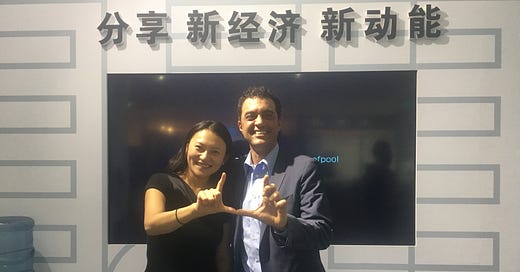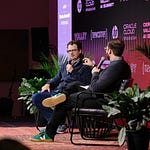This is definitely an episode you’re going to want to listen to.
It’s been a long time coming.
It’s a sequel of sorts to my interview with Bill Gurley that ran a few months after launching this newsletter and my conversation with Dara Khosrowshahi after that.
I finally convinced Emil Michael, a central player in the Uber saga, to give me an on-the-record interview.
Michael was once Travis Kalanick’s top lieutenant. He raised about $15 billion for Uber during his nearly four years at the company. Finally, he came on Dead Cat to talk to Tom Dotan and me. It’s been five years since Kalanick and Michael acrimoniously departed the company they helped build into a juggernaut.
While Michael isn’t Kalanick — who I would love to interview again someday — he was probably the second most important person at Uber during the period, understood the company and Kalanick intimately, and is a lot more willing to publicly reflect on what Uber got right and wrong than his old boss.
We covered a lot of ground in our hour and a half long conversation. Michael didn’t shy away from much.
Whether you’re interested in the inside baseball behind Kalanick’s ouster, or if you want to learn from Uber’s mistakes, or you just want to hear how they raised so much money, you’re going to want to give this episode a listen.
He talked about his infamous visit to a shady Korean karaoke bar that led former U.S. Attorney General Eric Holder to recommend Michael’s dismissal. (In my mind, probably the biggest unreported information from the Kalanick era is the Holder report itself. If anyone ever wants to leak it to me, you know where to find me.)
We discussed the latest media Uber obsession — “The Uber files.” The Guardian and other outlets reported on Uber’s influence campaign in Europe and the “kill switch.” It was a trip down memory lane that helped convince Michael to give his side of the story. Michael quipped about the “kill switch,” Uber’s tactic of locking down computers ahead of government raids: “I do think one of the bad things we did at Uber was naming things terribly.”
Michael inveighed against Benchmark partner Bill Gurley’s crusade to push out Kalanick. But he also reminisced about how he and Gurley used to talk multiple times a day.
Michael criticized current Uber CEO Dara Khosrowshahi’s management of the company, today worth $44.2 billion — about a third less than when Michael helped the company raise at an approximately $70 billion valuation. “When does the buck stop at Dara’s desk?” Michael asked us. But Michael also kicked himself for letting the merger with Lyft slip through his fingers.
We talked about the media coverage of Uber past and present, what the press got right, and what it got wrong. But Michael also admitted that he’d never really figured out how to talk to the press.
Together, we analyzed the Uber TV show, Super Pumped.
Michael engaged with core questions about Uber’s existence: Was the independent contractor model an inescapable original sin? Should investors ever have given Uber so much money? Was the Saudi round that valued Uber at about $70 billion a fair benchmark by which to judge Uber’s current CEO?
Given the many twists and turns of the Uber saga, there’s always more I wish that we’d dug into. We could have dedicated a whole episode to the Susan Fowler saga, for instance. And for every scandal that we examined, there’s another that we left out. Still, I think it’s as in-depth a public reflection as there has been from Kalanick’s camp since Kalanick resigned almost exactly five years ago.
Toward the end of our conversation, I asked Michael: “Did you push back on Travis enough? Or did he like having people who are sort of like—”
And he filled in the blank for me. Was he a “yes man”?
Michael said, “I would at least say this on a relative basis: I did more than anyone else in history of giving him feedback. Whether it was investors or other leaders, whatever, because we had a relationship that allowed for that. And I cultivated that on purpose because I wanted to be someone who is able to be a counter voice there. And he listened to me.”














Share this post